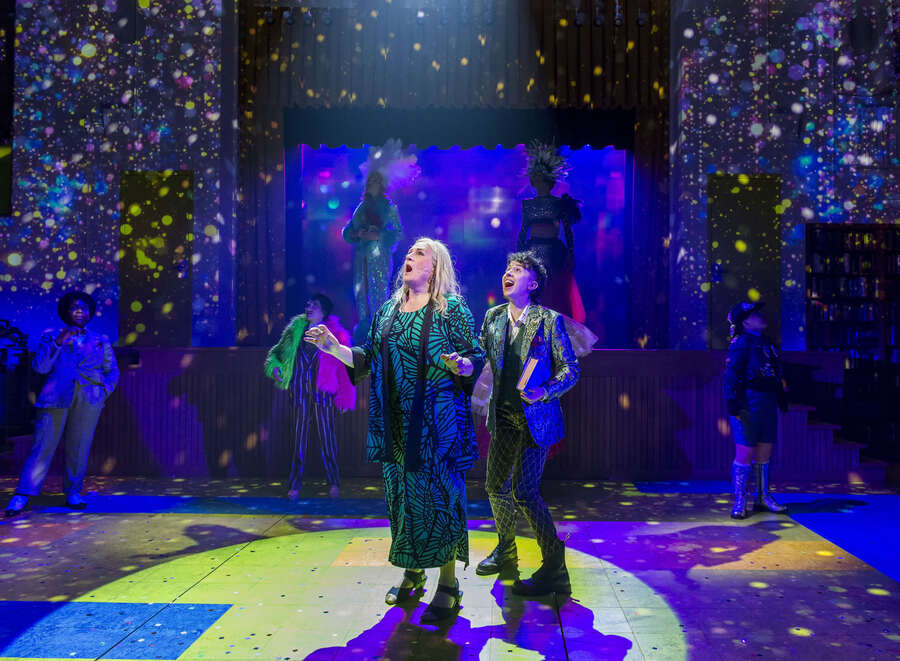Forty episodes and a feature-length musical finale make up the five seasons of the TV show Transparent on Amazon. That’s a lot to distill into one evening of musical theatre. So the creators of A Transparent Musical—TV showrunner Joey Soloway, playwright MJ Kaufman, and Joey’s sibling Faith Soloway—are doing something different. In the show that opens tonight at Center Theatre Group’s Mark Taper Forum in Los Angeles, the team are revisiting the TV show’s characters with a new story that fits the theatrical medium, while attempting to stay true to the spirit of the show.
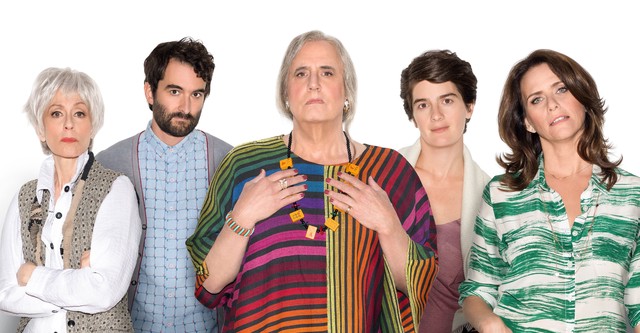
The division of labor is thus: Joey and Kaufman co-wrote the book, while Faith, who was also a writer on the TV show, wrote music and lyrics. Faith said they have long been dreaming of telling this story, which is partly based on their own family, as a musical, and has been working on it for at least seven years, even before the TV series’ musical finale.
“When dialogue isn’t enough to hold the emotion, we sing,” said Faith. “It’s that other dimension of prayer or celebration or the unspeakable that becomes the singable. I don’t think this story has been told in musical theatre, or even non-musical theatre, of a matriarch or a parent coming out as trans.”
The series followed the Pfefferman siblings—Sarah, Josh, and Ali—as they navigated the changes to their lives when their parent came out as a trans woman, Maura. The stage musical centralizes the action to the (fictional) Cecile J. Janowitz Jewish Community Center, and focuses on youngest sibling Ali’s nonbinary journey, something that was explored in later seasons of the TV show. “You have to have a much more clear protagonist in theatre,” Joey said. “You can’t have as much of a group narrative.”

In looking for answers about her family’s past to better understand her own identity, Ali investigates her family’s history in Weimar-era Berlin just before the rise of Nazism. “It’s a play about several generations of queer and trans Jews, and that feels so exciting to write,” said Kaufman, who, like the Soloways, is also Jewish. “That’s a reality and world and community that I live with and in that I don’t get to see reflected in media very often.”
The intersection of trans and Jewish history has always been important for Joey, particularly the work of German physician Magnus Hirschfeld, a pioneer in the LGBTQ movement who founded the Institut fur Sexualwissenschaft (Institute for Sexual Research) to study human sexuality. “I’ve always felt like as a culture maker it’s our responsibility to take ideas that might be too complex for the news or for a class,” Joey said, “and turn them into feeling, so that you can translate larger ideas into more emotional communication with people.”
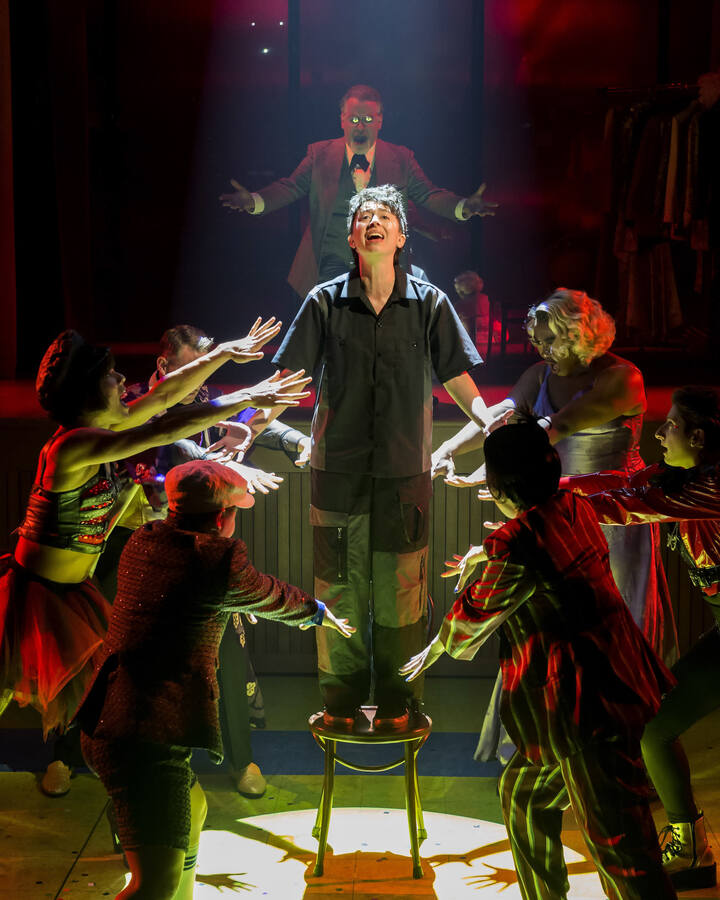
And now, with antisemitism on the rise and the introduction of more hateful legislation putting fragile trans rights under attack, audiences might understand the dangers of fascism’s insistence on binaries, on in and out groups, and can see the clear connections between white supremacy, transphobia, and antisemitism in a way that they might not have when the TV show premiered in 2014, before Donald Trump was elected president.
“Trans and Jewish people being persecuted was sort of in the rearview,” Faith said. “As we got closer to where we are in 2023, it’s right in front of us. It feels like there’s more of an emergent need for this art and this statement than ever. It’s sad that we’re here, and awful, and we also feel rejuvenated and inspired because of it.”
This show is part of a season at the Taper that features all woman-identifying, transgender, or nonbinary playwrights. According to Center Theatre Group, the Soloways and Kaufman, who all identify as nonbinary transmasculine, are the first transgender and nonbinary creators to have their work produced at the Taper.
“I always try to push back against a trans ‘first,’ because we never know who was trans and closeted in the past or who wasn’t able to live as their true self in the past,” said Kaufman. “So it feels like a false claim to ever name a trans first. But I think it’s an exciting honor that they are inviting our work into this space in a public, open way about transness that they haven’t before, and I hope that it means that they do much more work by trans people.”
Joey credits Jeremy O. Harris for using his privilege to make room for women and trans writers. It was Harris who threatened to pull Slave Play from a planned CTG season over the gender imbalance in the theatre’s 2021-’22 season, and in turn is partly what led to the Taper’s commitment to this season’s lineup. “I’m not saying that it never would have happened without that kind of allyship or accomplice-ship, calling out and making demands when you can afford to with your career,” Joey said. “But wow—it is such an overwhelming, exciting example of how people can work across intersections to make space for other people to come aboard.”
In the show’s cast of 16, more than half identify as trans and/or nonbinary, and all trans and nonbinary characters are played by trans and nonbinary actors. On television, Maura was played by a cisgender man, Jeffrey Tambor (who famously was fired from the show over allegations of sexual impropriety). In the musical, though, it was a given that she would be played by a trans woman, Daya Curley.
“In some ways, Transparent created so much representation that it stopped its own ability to exist,” Joey said. “Transparent created a world where Transparent wasn’t needed and couldn’t really exist as it did. In fact, by the time we ended Transparent, we were already looking for ways that Maura could be recast. It was five short years—that’s how quickly culture moved. I cannot wait for people to see Daya. These songs are sung by somebody who was a late transitioner, who sings in her heart voice, who understands the way Faith’s songs have been written by a trans person for a trans person.”
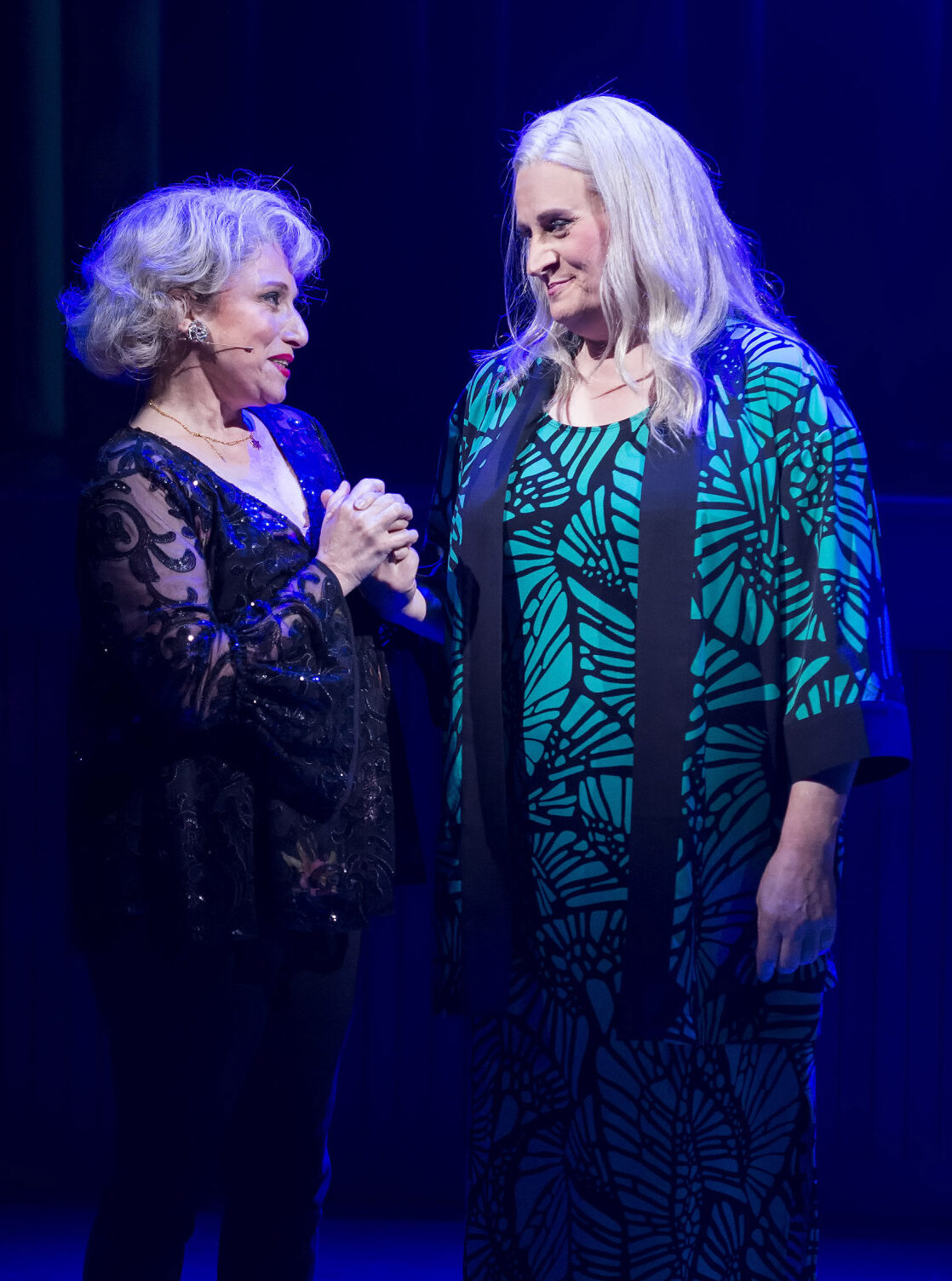
Faith credits a lot of musical influences on the show’s score: pop, rock, jazz, and klezmer, with the style depending on who is singing. “I don’t even know how to categorize what this music is,” Faith said. “I think it’s new and old.” For example, songs sung by Shelley (Maura’s ex-wife, and Sarah, Josh, and Ali’s mother) sound like what she might have listened to growing up—Cole Porter, Borscht Belt—while the songs for the kids are more contemporary. The group numbers have a “rock ‘n’ roll Jewish feel.” Although the musical deals with generational trauma, it is also a defiant and joyous celebration of identity, which comes out in songs like “Jewish and Queer.”
Something that did carry over from the TV show: the rhythms of dialogue and the way the siblings interact. Transparent authentically depicted how a contemporary white Ashkenazi family communicates with each other. “That feels very culturally home to me and complex and something that I’m so interested to interrogate,” Kaufman said. “There are so many sayings and so much Yiddish sprinkled through the play, which felt really easy to plug into and participate in.”
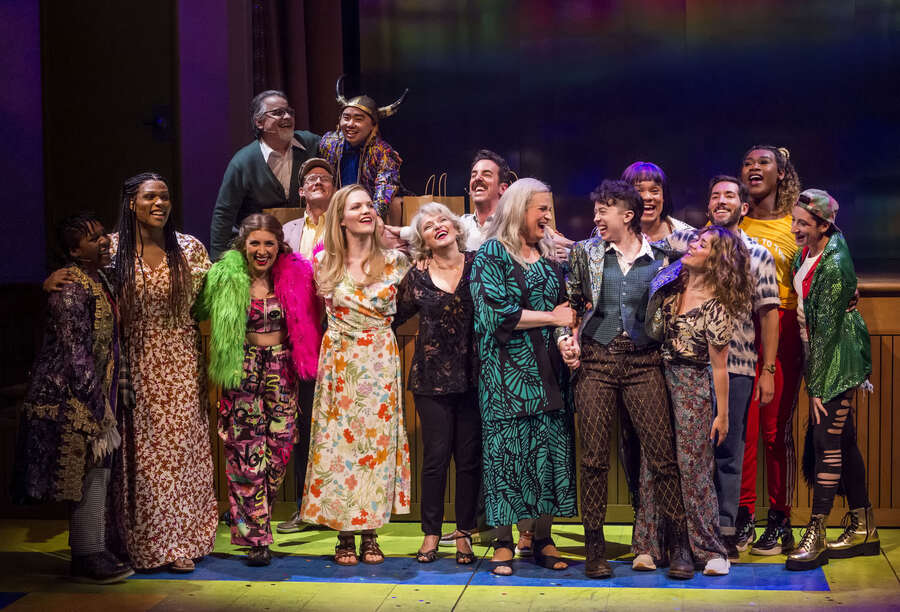
The chemistry among the TV show’s siblings is something that developed over time, as only a multi-season series cast can. But the Soloways feel that, under director Tina Landau, the show’s cast—Sarah Stiles as Sarah, Zachary Prince as Josh, and Adina Verson as Ali—were able to forge a similar bond.
“The actors who played the three siblings on the TV show and the actors who play the three siblings in the play have all magnetized to one another in the exact same way, where they immediately become like real siblings,” Joey said. “And we, as writers, musicians, directors, producers, can’t get in because they’re already siblings in this beautiful way. They create their own relationship. I feel like the chemistry—of how the actors went through the Pfefferman portal to become human—definitely has transferred into the play.”
There’s another trait of the TV show that Faith is especially hopeful the musical shares: opening the gates for more trans artists to have their work produced in the theatre, in much the way the show opened the door for more trans protagonists and creators in television. “It’s the cultural acceptance of having an example in front of you,” Faith said, “that will hopefully let the powers that be within theatre—the gatekeepers, the producers—get more expansive in their ideas of what could be commercial and get audiences.”
Linda Buchwald (she/her) is a theatre journalist based in Los Angeles who has written for TheaterMania, Playbill, TDF Stages, Kveller, and more. On Twitter: @PataphysicalSci.

